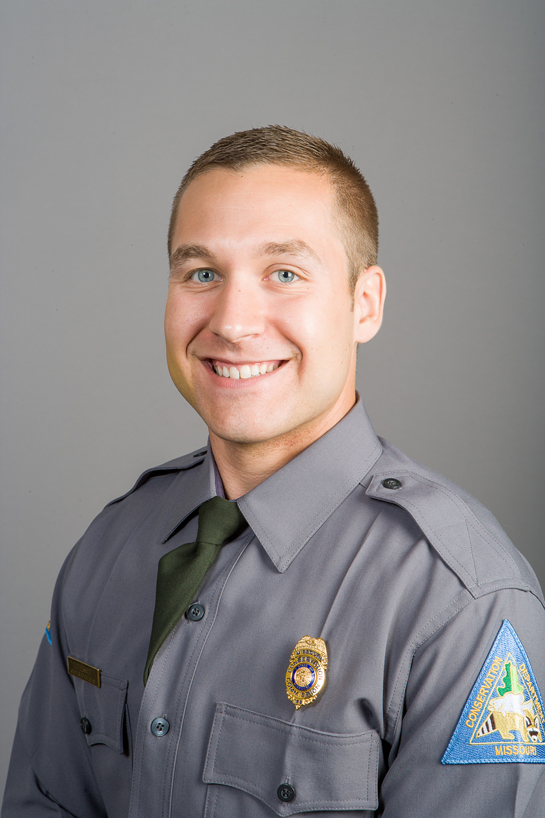Nick Bommarito always had a different future in mind than so many of his classmates as he worked toward his bachelor’s degree in criminology and criminal justice at the University of Missouri–St. Louis.

The Missouri Department of Conservation announced in December that UMSL alumnus Nick Bommarito would be serving as the conservation agent for New Madrid County in southeast Missouri. (Photo courtesy of the Missouri Department of Conservation)
“For the most part, most criminal justice majors seemed like they wanted to get on with the police department or get on with some kind of federal agency,” the 2014 graduate said.
Bommarito, on the other hand, imagined himself – ever since he was a young teenager – going to work for the Missouri Department of Conservation.
The vision became a reality last fall when Bommarito graduated from the department’s training academy and was installed as the lone conservation agent for New Madrid County in Missouri’s Bootheel.
In his new job, Bommarito is charged with enforcing the rules of the Wildlife Code of Missouri along with other state and federal laws.
Agents, who are licensed peace officers, typically spend warmer months checking fishing permits and creel limits and might also catch people fishing through illegal methods. Colder seasons are spent monitoring hunting activities, with patrol and stakeouts a regular part of the responsibilities.
Bommarito, who hails from south St. Louis County and graduated from Oakville High School, grew up hunting and fishing with his father. Some of his earliest memories of the outdoors have him sitting on his dad’s lap with a shotgun during spring turkey season or fishing at his grandmother’s lake house near Potosi, Missouri.
He also recalled a hunting trip he and his dad took when he was 13 to a conservation area in Jefferson County where they ran into a conservation agent and began chatting with him.
In the midst of their conversation, some out-of-state hunters walked out of the woods, and the agent discovered they lacked Missouri permits and had been using an impermissible hunting method for that time of the year.
Bommarito closely watched the interaction between the agent and the hunters and peppered him with a few more questions about it afterward.
“That’s kind of what sparked my interest in being an agent,” he said.
Agents can come from a wide range of backgrounds. The Missouri Department of Conservation requires that applicants have a bachelor of science degree in forestry, fisheries management, wildlife management, wildlife conservation, natural resources, agriculture, education with an emphasis in science or biology, conservation law enforcement or criminal justice.
Bommarito chose criminal justice.
“Like I said, I grew up in the outdoors, and I knew a lot about wildlife,” he said. “But I really wanted to learn more about criminal justice and different aspects of it. It’s definitely helped me a lot in this job.”
Bommarito first enrolled at St. Louis Community College–Meramec after finishing high school.
He took part in the A+ Scholarship Program, which provides funding to eligible graduates of A+ designated high schools who attend a public community college or a vocational or technical school.
Bommarito completed work for his associate degree and transferred in 2012.
“I wanted to go to a school that had a good criminal justice program, and I heard nothing but good things about UMSL,” Bommarito said. “It was the school that was still close to home where I could work while going to school. It made it easy.”
He didn’t regret it.
“I learned at UMSL,” Bommarito said. “I had a lot of good professors, and I took a lot of good classes. It definitely helped prepare me for the job that I’m doing now.”
He was working full time, either at Dierbergs or for a local landscaping company, throughout his two years on campus.
In 2013, he also started volunteering with the Missouri Department of Conservation’s Protection Division, giving him another opportunity to interact with and observe men and women in his intended profession.
Bommarito took an hourly job with the conservation department, working as a resource aide in the Wildlife Division at Columbia Bottom Conservation Area in north St. Louis County after finishing his degree in May 2014.
He transferred to the Forestry Division a year later and worked as a resource aid at Rockwoods Reservation in Wildwood, Missouri.
To be admitted to the academy requires going through a process that includes two rounds of interviews, completion of a background check, a psychiatric evaluation and a physical fitness test.
Bommarito gained acceptance on his second try in 2016. He was one of 12 – chosen from a pool of roughly 500 applicants – to complete the six-month training program in October. Each filled an opening in one of the state’s 114 counties.
He had not really spent much time in the Bootheel before getting his assignment there, but he’s settling into his new home and new job.
Agents spend at least their first six weeks riding on patrols with field training agents or their district supervisors to complete their training, but Bommarito is now venturing out on his own.
The job allows him a flexible schedule, but he’s been getting up early lately while monitoring hunters during what surely has been one of the busiest times of the year with deer season running into January and water fowl season running into early February.
He’s also tasked with performing various outreach activities, such as talking to school children about the outdoors, leading hunter education classes or conducting interviews with the news media about conservation department initiatives and programming.
In his off hours, Bommarito has tried to find time to do some hunting and fishing of his own.
“I’m still pretty new to this area, so I’m still trying to find out where some good hunting spots are down here,” he said. “But as I’m down here more, I’ll be able to figure out some good spots and go hunt and fish a little bit more.”















